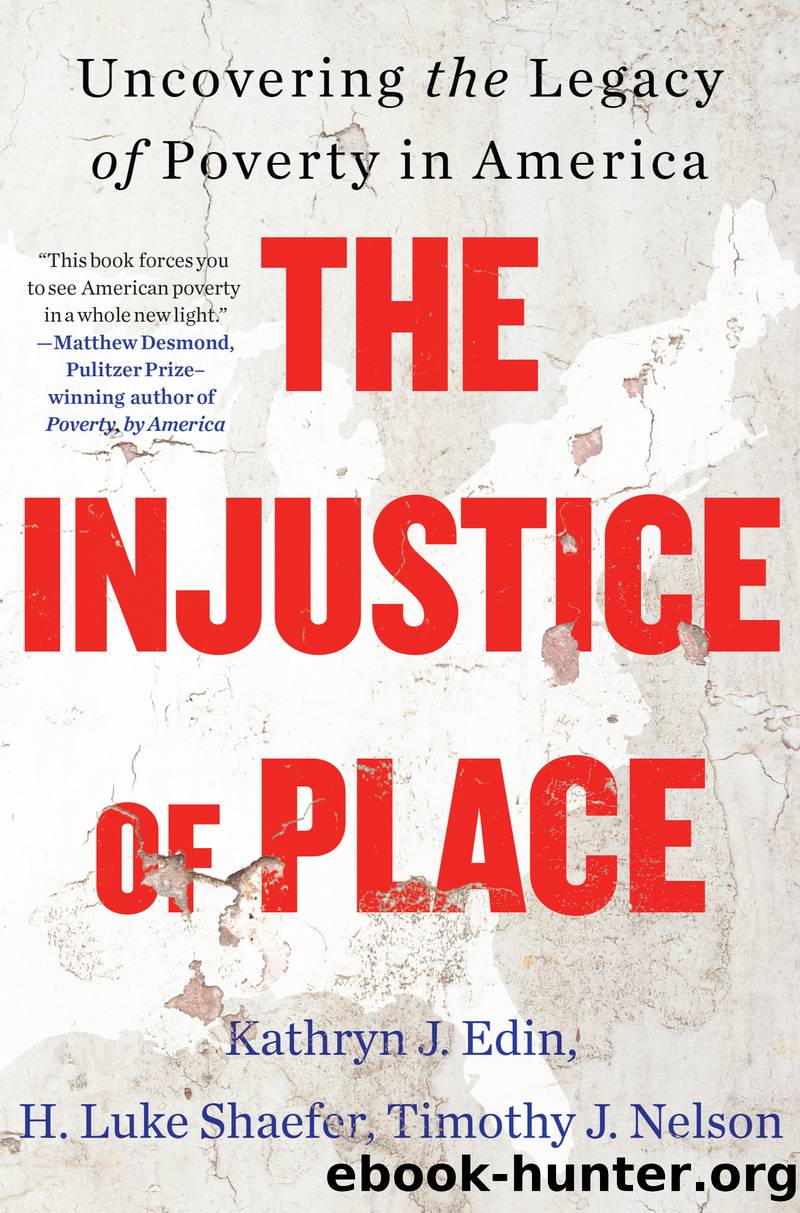The Injustice of Place by Kathryn J. Edin

Author:Kathryn J. Edin
Language: eng
Format: epub
Publisher: HarperCollins
Published: 2023-05-26T00:00:00+00:00
WAR FOR CONTROL IN THE WINTER GARDEN
âThere is one Texas that is . . . rich,â a Look magazine article titled âThe Other Texansâ claimed in 1963. Yet the vast majority of the population, the article continued, was âat the bottom of the scale on virtually every criterion measuring health, wealth, education and welfare.â Nowhere was this more true than in Crystal City, Texas, where by the early 1960s, Mexican Americans outnumbered Anglos by a margin of four to one. Yet the ârichâ Texans in Crystal Cityâthe tiny Anglo minorityâcontrolled nearly every aspect of life for the âotherâ Texans living there.
In his account of this era in Crystal City, political scientist Armando Navarro details the many reasons why Mexican American laborers came to recognize that far from having their best interests at heart, the cityâs Anglo leaders were corrupt. In one scheme known as the âVeteranâs Land Board Scandal,â speculators took advantage of a program providing low-cost land loans to veterans by purchasing land at rock-bottom prices and reselling it to program participants at egregiously inflated prices, with some government officials allegedly taking a cut. The scandal, which was brought to light in 1955, involved Zavala County officials and other county bureaucrats all the way up to high-ranking state officials. Another point of contention dating to the late 1950s involved federal urban renewal dollars, which, at the direction of Anglo leaders, were spent to improve the Anglo-dominated business district, while roads remained unpaved in Mexican American neighborhoods and half the town lacked a sewage system. Then, during the harsh winter of 1962, a freeze wreaked havoc on crops, leading to widespread unemployment among farm laborers. More than a hundred Mexican Americans marched to demand that the county offer a surplus food program. The authorities approved the program but refused to extend it after the first thirty days, fearing that if the program continued, the laborers might be less willing to remain in the fields.
Inspired by news of civil rights activism in the Cotton Belt, a group of Mexican Americans in Crystal City decided they wanted more say in the community. In their minds, that started at the ballot box. The first step was to get more people registered to vote, a goal hindered by the $1.75 poll tax. In early 1963, a poll-tax driveâan effort to raise money to cover the poll tax for Mexican American votersâwas organized by the Teamsters Union in partnership with a group called the Political Association of Spanish-Speaking Organizations (PASSO). One historical account describes how mothers made tamales from ingredients donated by Mexican-owned stores, with young people selling them door-to-door for $1.75âthe amount required to pay the poll tax for one person. Women organized boycotts against stores that refused to donate ingredients. The local Catholic churchâs parish hall was pressed into service as a venue for dances and cakewalks. The price of admission? $1.75. PASSO trained young leaders like Jose Gutiérrez (who would go on to play a role in the 1969â70 cheerleader revolt) in the art of electioneering.
Download
This site does not store any files on its server. We only index and link to content provided by other sites. Please contact the content providers to delete copyright contents if any and email us, we'll remove relevant links or contents immediately.
International Integration of the Brazilian Economy by Elias C. Grivoyannis(57389)
The Radium Girls by Kate Moore(10915)
Turbulence by E. J. Noyes(7057)
Nudge - Improving Decisions about Health, Wealth, and Happiness by Thaler Sunstein(6642)
The Black Swan by Nassim Nicholas Taleb(6203)
Pioneering Portfolio Management by David F. Swensen(5616)
Rich Dad Poor Dad by Robert T. Kiyosaki(5162)
Zero to One by Peter Thiel(4834)
Man-made Catastrophes and Risk Information Concealment by Dmitry Chernov & Didier Sornette(4748)
Secrecy World by Jake Bernstein(3788)
Millionaire: The Philanderer, Gambler, and Duelist Who Invented Modern Finance by Janet Gleeson(3576)
Skin in the Game by Nassim Nicholas Taleb(3477)
The Age of Surveillance Capitalism by Shoshana Zuboff(3432)
The Money Culture by Michael Lewis(3291)
Skin in the Game: Hidden Asymmetries in Daily Life by Nassim Nicholas Taleb(3272)
Bullshit Jobs by David Graeber(3190)
The Dhandho Investor by Mohnish Pabrai(3176)
The Wisdom of Finance by Mihir Desai(3086)
Blockchain Basics by Daniel Drescher(2896)
